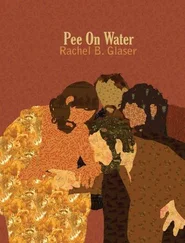I had so much potential, Paulina thought as she looked for a spot to sleep in the park. But I am renowned for nothing! She moaned loudly, stirring the dealers from their benches. Two scuttled toward her in the darkness, trying to sell her drugs.
The next morning, when Harvey was again unavailable, Paulina read off the number of the pay phone to the secretary. This time she added that it was Urgent! and that she’d be leaving the country very soon.
All day she sat in the phone booth, eating old croissants from the bakery across the street. Finally the phone rang. Paulina took a deep breath, smoothed her eyebrows, and answered it as professionally as she knew how, but it was a woman asking for Percy. Though men of all shapes and sizes walked by with briefcases and dogs, holding phones to their faces, smoking their cigarettes, Paulina insisted there was no soul in sight. When the woman kept chattering on, Paulina hung up.
She left the booth only to pee and get water. She watched birds peck at a pizza crust until it was just a few burnt crumbs. Every time the phone rang, it was the same woman. “I can see no man living or dead,” Paulina said, tired of life.
“But Percy gave me this exact number!” the woman cried.
“What does he look like,” Paulina asked. “In case he shows later.”
“He’s short and pale and has eyes like the devil, and he’ll be drunk because Aggie doesn’t care right for him—”
“Just give me your number,” Paulina said. “I’ll write it down.”
The woman repeated her number twice, and Paulina said uh-huh after each digit, but did not write it down, did not care what became of Percy or anyone else. She slumped against the cold glass. She felt like a useless body of itches, pains, and wants.
She spent the night in the phone booth, awakened twice by crazy people who wanted the phone, and once by a cop with something to prove. Harvey didn’t call. After a second day by the phone, she was dreaming of the old college town. Could she live in some unused studio, getting swipes off freshmen’s meal cards? A hunched woman poked Paulina’s bag with a stick. Paulina shooed her away.
Though Gretchen had outgrown Fran professionally and emotionally and now had more than a dozen friends she much preferred, she still spent an occasional hour or two with Fran if she showed up outside Gretchen’s office after work. She still found relief looking at Fran’s face — it truly was like a face from a painting, the eyes staring into thoughts, the mouth open slightly in the moment before or after speaking.
It had been more than a year since Fran moved out of Gretchen’s apartment. While they inhabited the same space, Fran’s life seemed to crawl by one minute at a time, as Gretchen waited for her to get an interview, and then an outfit, and then an apartment. You could at least do the dishes, Gretchen had thought every day she came home to find Fran lying stoned on the carpet with a T. Rex song on repeat. After Fran moved out, her life seemed to move at an accelerated pace. Every time they talked there was some boy or roommate or coworker taking up her thoughts, as it had been before with Julian and Paulina.
At a bar, Gretchen half listened to Fran’s issues with her latest boyfriend, a psychology major who insisted on biking to Fran’s Bushwick sublet and always arrived late, exhausted, and ranting about animal rights. Once Fran had taken him to a party at Gretchen’s and he’d sat in a closet, reading the New York Times on his laptop. Before him she had been seeing a waifish sound recorder Gretchen had never met, but whose penis Fran had twice drawn for her on a napkin.
Since Fran made little money painting ceilings and walking dogs, while Gretchen landed client after client, Gretchen regularly paid for their meals and drinks, while Fran mumbled things about “getting a real job” and “taking whatever I can get.” This time, when Gretchen was about to lay down her card, Fran stopped her and put down cash instead.
“Okay, so here’s the real news,” Fran said, nearly skipping toward the subway. “That career counselor got me an interview for a job writing test questions. I had it yesterday. I got it!”
“Congrats!” Gretchen said, truly startled at the news.
“I bet it will give me a lot of painting ideas.”
“Really?” Gretchen asked, no longer hiding the doubt she so often hid by forcing her eyebrows straight and her voice even.
“Well, it’s visual art test questions, so it’s creative.”
“Where is it?”
“Ohio.”
“You’d leave all this for Ohio?” she asked, pronouncing the word like it was an ancient place no longer on the map.
“There are still people in Ohio. There are bars. I think there’s even art in Ohio!” Fran was showing some of the old, senseless passion that Gretchen had forgotten. “Jim Dine is from Ohio. Jim Drain is from Ohio. .”
“I know someone who fucked Jim Drain,” Gretchen ventured.
They silently crossed the street.
“Yeah?” Fran waited for Gretchen to ask her more about the job, but Gretchen was covertly checking her phone. More and more often Gretchen chose the tiny world in her phone over Fran. She scrolled through the little pictures of the little people in the phone, her face lighting up with a ghost-white glow.
“I thought you’d be excited for me,” Fran said, staring at a homeless woman sleeping under cardboard.
“You should be painting, not selling your soul,” Gretchen said without looking up.
“Since when do you care about my paintings?” Fran asked, watching Gretchen drop the phone into her leather purse. “You know, I saw that drawing I gave you. You folded it.”
“What? The one you were going to throw out anyway? The one I rescued? Does it have a sort of dog person licking an angel?”
“It was Marvin as a deity, I think,” Fran said haltingly. It wasn’t such an achievement, Fran admitted to herself, but folding a drawing was inhumane. This kind of moment was occurring more often between them. It was like the bending of a stick — a moment where one could push harder and finally snap the bond. Fran would feel Gretchen’s view of love was callous, or Gretchen would challenge Fran’s nostalgia for school, but always they let the disagreements die in silence, protecting the tradition of the friendship, though sometimes that was all it was. They saw each other because they saw each other. They saw each other because they’d seen each other.
But Fran was thinking of her new job now; she no longer cared about the drawing. Burn the past to light the future, she thought, though the words came from an unknown source. “Anyway, I’ve been packing and stuff. I’m excited.” She pictured herself at a desk, in her own cubicle. She imagined a digital display of all her earnings — big red numbers climbing quickly, like the ones near Union Square.
Gretchen suddenly remembered the coat she’d once lent Fran, a Rebecca Taylor coat that was surely the most expensive item in Fran’s closet.
“I don’t know how my roommates will take it,” Fran said thoughtfully. “I haven’t told them yet because I wanted to wait until I really—”
“Can I have my coat back?” Gretchen asked. “I mean before you pack it up.”
“What?” Fran searched her pockets for her MetroCard as they took the steps down to the L train. “Oh yeah, of course.”
The donate/destroy pile took up half of her room. Boxes of plaid stockings, gold leggings, fringe-covered boots, a zip-up one-piece with racing stripes, a tinfoil crown, ribbons, garish SUPERTHRIFT purses, high school friendship rings, mix tapes from boys, depressing underground comic books, old art history handouts, and a globe that Marvin had painted black. “I won’t need this stuff in Ohio,” she told Gretchen, who pawed through the clothes without finding a single thing worth adopting.
Читать дальше












